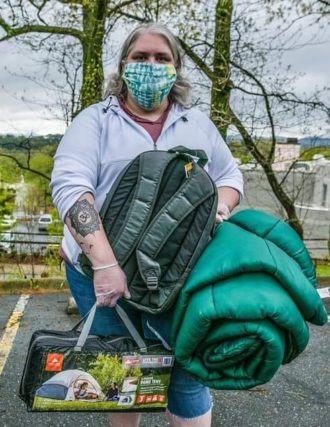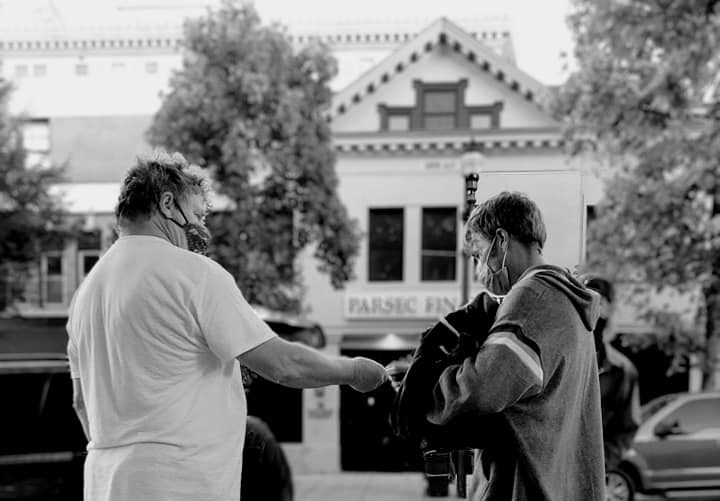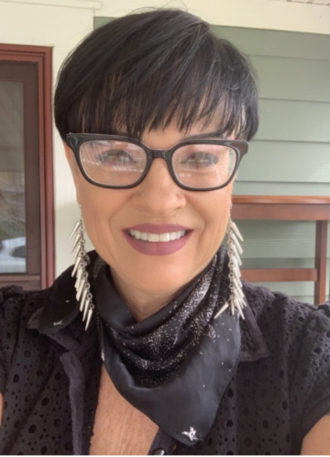These days, Mary Jones expends most of her energy trying to find warm, safe places to sleep at night; she was evicted from her rental home three months ago. When COVID-19 hit and her roommates had to continue working, she had to ask them to leave, because severe asthma puts her at high risk of lethal complications from the virus.
With an income of less than $800 a month, Jones couldn’t afford to pay the whole rent herself; she wasn’t able to find new roommates in time to forestall her eviction. She moved to a tent on private property in Madison County, but as the weather turned colder, she began to look for alternatives.
Then, at the end of October, Tropical Storm Zeta destroyed her tent.
“If I’m going to follow the guideline of spending 30% of my income on housing, that’s about $250 a month, and that’s not possible,” she says.
Jones has applied for Section 8 housing, but the wait for an apartment is upward of three years, especially since Gov. Roy Cooper issued Executive Order 171 on Oct. 28. The order, which Jones applauds, shields renters from eviction due to nonpayment of rent or related charges, meaning fewer units are available.
“It’s 100% COVID-19 that put me out of my home,” she says. “And it’s COVID-19 that makes shelters, motels and roommate situations unsafe for me. I have fallen through every crack there is to fall through.”
Jones has established a GoFundMe page to enable her to rent a small space — or even a shed — for the winter, but she’s had to use the money raised so far to pay for a new tent, warm blankets and cold weather clothing.
No ready solution
COVID-19 has had a huge impact on people who are homeless, advocates report. With a vacancy rate of between zero and 0.1% for affordable housing in Asheville, says Eleanor Ashton of Homeward Bound, there simply isn’t any to be found.
And with AHOPE Day Center, the nonprofit’s shelter, closed for renovations, clients can only pick up mail there. “We’re still seeing 100 people a day, but they can’t shower there, can’t have lunch there, can’t warm up there, at least until mid-December,” notes Ashton, the organization’s senior resource development director. “For people experiencing homelessness, this is going to be a brutal winter.”
As the weather grows colder, it will be increasingly difficult for people to get and stay warm, she says, and Code Purple, the status that allows shelters to take in more people on nights when the temperature falls below freezing, has been overriden by the pandemic.
“We can’t do Code Purple,” says Micheal Woods, executive director of the Western Carolina Rescue Ministries. “We can’t take in people who have not been screened without risking the people already here and who have been screened.
“For any number of reasons,” he continues, many of the folks who, in the past, took advantage of Code Purple “aren’t people who follow all the rules of living in a shelter. That doesn’t mean they should freeze.”
And despite years of efforts to address the local housing crunch, there are still very few places that low-income people can afford.
One such project, BeLoved Asheville’s tiny home village, will house a dozen or more people once it’s complete, with payments that even someone living on disability can afford. Because it’s owned by the community, not a bank, there’s no need to make a profit. It’s a promising model, says the Rev. Amy Cantrell, one of the nonprofit’s co-directors. The group has secured property (a gift from the Land of the Sky United Church of Christ) and received enough financial donations to build the first house, which is now complete.
“But this is not the solution for this winter,” stresses Cantrell. “We’re in the middle of an eviction crisis, and people on the street have fewer resources because of the pandemic.”
Among other things, it means shelters are housing fewer people, and meals must be served outdoors in to-go containers.
“We distribute 500 meals a day,” notes Woods. “We feed everyone who comes, but it has to be outdoors, so people can’t come in and warm up.”
The Haywood Street Congregation is facing the same limitations, says Executive Director Laura Kirby. The church’s Wednesday lunch draws more than 600 people a week — considerably more than the pre-COVID-19 numbers, she says.
“We have set up three tents in the parking lot so we can do recovery groups and allow people to meet with partner agencies, and we plan to put heaters in those tents. It’s not a perfect solution, but it’s something.”
Warm clothes, camping equipment needed
BeLoved and other agencies are collecting warm clothing and camping equipment, hoping it will be enough to keep people alive through the winter.

Perhaps the most severe impact is on the Latinx community, says Cantrell. “They’re not eligible for any government help, so they’re scrambling for the most basic things. They can’t even afford diapers.”
Accordingly, BeLoved has collected several tons of supplies, including sleeping bags, tents, blankets, water, food, diapers and cleaning supplies. The Rescue Ministries held its annual drive for coats, hats, gloves and hand warmers on Nov. 7; the Haywood Street Congregation and Homeward Bound are also accepting donations (see box).
But the lack of such staples is only part of the problem. “In addition to the virus, there’s a racism pandemic and a poverty pandemic,” says Cantrell. “We have our street medic teams out trying to address the lack of access to even the most basic care.”
Tents, sleeping bags and clothes are even more crucial because there are fewer places where people can escape from the cold, notes Ashton. “You can’t go into Ingles and sit down with a cup of coffee for a half-hour anymore,” she points out. “We’re hoping to get together with faith community leaders to provide warming stations — places where people can go for a bit, maybe have some coffee and a snack.”
The warming stations would utilize a model similar to the one used by the Room in the Inn program, a women’s shelter that moves from church to church. Run by Homeward Bound, it relies on volunteers who supervise, cook meals and engage with the women.
Woods has been recommending widespread rapid-testing protocols so people can be admitted to shelters more quickly, but those test kits aren’t readily available. One company Woods looked into last spring now has an eight-month backlog.
“This has been a failure of government on every level,” he maintains. “I’ve been saying since March that winter is coming, and people kept saying we had plenty of time to put together a workable plan. Well, here it is, and we’re not prepared.”
Woods isn’t sure what it will take to get people to come together and make a plan that will help people stay warm.
Meanwhile, Jones plans to “driveway-surf” — camp out in people’s yards — through the winter, provided she can find enough folks to host her. “It’s one day at a time,” she says, adding, “I’m grateful to everyone who has helped me.”
Woods, however, fears that some folks won’t be able to stay safe — or even alive.
“I’m just afraid that it’s going to take people freezing to death before anybody is ready to make a plan, and in my opinion, that’s too late.”




Isn’t this human need one reason churches are tax exempt? Shouldn’t they be falling over each other, offering assistance to people in need??
I don’t know how she manages to exist on only 3k a month.
Perhaps you should re-read, since the article clearly states she lives on less than $800 a month.
But add the two GoFundMe accounts that have been running for four months, $8,935 and the $780/month SSI over same 4 months, divide it by 4 and you get 3k a month. Not too shabby.
Obviously, you’ve never been poor. She has been raising money to keep a roof over her head. She would be in the street otherwise, and most of that money went for essentials — like her tent and the rent she pays for a place to pitch it. Seems like someone’s heart is a little too shabby. It’s rather unfair to take one-time contributions and assume she has that every month. I am done interacting with you here.
$12,055 is the total of combined income plus GoFundMe collected over 4 months. If you’re going for pulling people’s heart strings, check out the people in real trouble. Is there a shortage of people facing hardships so you had to use this story?
“It’s Easier to Fool People Than It Is to Convince Them That They Have Been Fooled.” – Mark Twain.
Hell, even the covid story is false. The eviction process started in 2019 for non payment. Papers were filed, finally, in December of ’19. And she somehow came up with the back rent at the last minute. They didn’t renew because of non payment in April, filed again in June, court in July, she moved out in August. She only ever had one roommate and that was for one month. I should be a reporter.